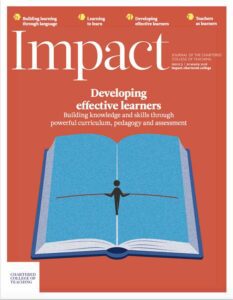Throughout my teaching career, I have consistently observed that attitude, rather than baseline data, indicates future success. Whilst some will inevitably struggle more with challenging concepts or a mathematical method, those who persevere tend to benefit. This led me to question whether self-regulated learning could promote improved attainment in science. A potential to succeed is more likely to be met if one views intelligence as a malleable set of abilities (Dweck, 2012) Following this simple, intuitive ideal, I conducted an initial study utilising Dweck’s self-reported questionnaire, which demonstrated that the attainment at A level of a cohort of 120 6th form students correlated better with their mindset than with the ALIS data supplied by CEM. Obviously, the small size of the year group in comparison with the national cohort, and reliability of a self-reported questionnaire must be questioned, and it is also possible that high attainment contributed to students
Join us or sign in now to view the rest of this page
You're viewing this site as a guest, which only allows you to view a limited amount of content.
To view this page and get access to all our resources, join the Chartered College of Teaching (it's free for trainee teachers and half price for ECTs) or log in if you're already a member.











